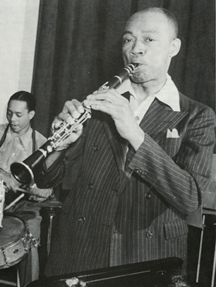Related Research Articles

Albert Edwin Condon was an American jazz banjoist, guitarist, and bandleader. A leading figure in Chicago jazz, he also played piano and sang.
Frank Teschemacher was an American jazz clarinetist and alto-saxophonist, associated with the "Austin High" gang.

John Gilmore was an American jazz saxophonist, clarinetist, and percussionist. He was known for his tenure with the avant-garde keyboardist/bandleader Sun Ra from the 1950s to the 1990s.

Jazz at Lincoln Center is part of Lincoln Center in New York City. The organization was founded in 1987 and opened at Time Warner Center in October 2004. Wynton Marsalis is the artistic director and the leader of the Jazz at Lincoln Center Orchestra.

Robert Sage Wilber was an American jazz clarinetist, saxophonist, and band leader. Although his scope covers a wide range of jazz, Wilber was a dedicated advocate of classic styles, working throughout his career to present traditional jazz pieces in a contemporary manner. He played with many distinguished jazz leaders in the 1950s and 1960s, including Bobby Hackett, Benny Goodman, Sidney Bechet, Jack Teagarden and Eddie Condon. In the late 1960s, he was an original member of the World's Greatest Jazz Band, and in the early 70s of Soprano Summit, a band which gained wide attention. In the late 1970s, he formed the Bechet Legacy Band.
James Dugald "Jimmy" McPartland was an American cornetist. He worked with Eddie Condon, Art Hodes, Gene Krupa, Benny Goodman, Jack Teagarden, and Tommy Dorsey, often leading his own bands. He was married to pianist Marian McPartland.
Free Music Production (FMP) is a German record label that specialises in free jazz.
Post-bop is a jazz term with several possible definitions and usages. Musicologist Barry Kernfeld wrote in The New Grove Dictionary of Music and Musicians that post-bop is "a vague term, used either stylistically or chronologically to describe any continuation or amalgamation of bop, modal jazz, and free jazz; its meaning sometimes extends into swing and earlier styles or into fusion and third-world styles." The term has been variously defined as a musical period, a musical genre, a musical style, and a body of music, sometimes in different chronological periods, depending on the writer.

Edmond Hall was an American jazz clarinetist and bandleader. Over his career, Hall worked extensively with many leading performers as both a sideman and bandleader and is possibly best known for the 1941 chamber jazz song "Profoundly Blue".
Shoji Suzuki was a Japanese jazz clarinet player and band leader nicknamed the "Benny Goodman of Japan".
Fletcher Allen was an American jazz saxophonist, clarinetist, and composer.
The Washboard Rhythm Kings, also known as the Washboard Rhythm Boys (1932), Georgia Washboard Stompers (1934-1935), Alabama Washboard Stompers (1930-1932), Washboard Rhythm Band (1932-1933), and Chicago Hot Five were a loose aggregation of jazz performers, many of high calibre, who recorded as a group for various labels between about 1930 and 1935. Bruce Johnson played washboard.
Franz Jackson was an American saxophonist and clarinetist of the Chicago jazz school.
Jack Bland was an American jazz banjoist and guitarist.
Paul Leroy "Ox Blood" Howard was an American jazz saxophonist and clarinetist.

This is a timeline documenting events of Jazz in the year 1916.
Lofton Alfonso Cooper was an American jazz saxophonist and clarinetist. He founded the Savoy Sultans and was their leader from 1937 to 1946. He was the half-brother of Grachan Moncur II.
This is a timeline documenting events of jazz in the year 1909.
Rhythmakers, sometime known as The Rhythmakers or the Chicago Rhythm Kings in later re-issues of their music, was a jazz recording group which recorded music in four sessions in New York City in 1932. A racially integrated ensemble, the group was unable to tour or perform publicly due to racial segregation laws enforced throughout the country. Nevertheless, the group's popularity on record helped to bolster support for racially integrated music groups in the years to come.
References
- 1 2 Mike Hazeldine (2001). "Chicago Rhythm Kings". Grove Music Online . Oxford Music Online. Oxford University Press. doi:10.1093/gmo/9781561592630.article.J084300.
- 1 2 Paige Van Vorst (2001). "Rhythmakers". Grove Music Online . Oxford Music Online. Oxford University Press. doi:10.1093/gmo/9781561592630.article.J377700.
- ↑ Rust, p. 153
- ↑ Sutton, p. 57
- ↑ Rust, p. 829
- ↑ Crawford & Magee, p. 18
- ↑ Bob Schulz discography on AllMusic